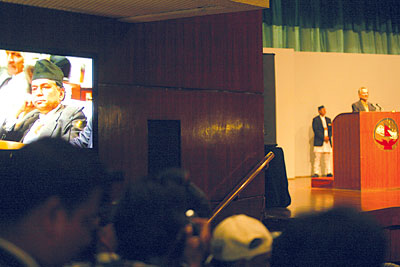 KIRAN PANDAY |
Sher Bahadur Deuba and Ram Chandra Poudel were pioneers of Nepali democratic student union politics. Jhalanath Khanal spent an austere underground life building the party for years; KP Oli was part of a group that believed in class annihilation. Pushpa Kamal Dahal spent three decades on the run, and built and maintained an underground organisation. Baburam Bhattarai left a comfortable career as a planner and academic to translate his ideas into practice.
When today's top leaders joined politics, they were inspired by larger ideologies, group interest and made innumerable sacrifices � in the name of the people. Perhaps the supreme irony of Nepali politics is that as the same leaders became stronger and entered Kathmandu's power maze, the principle of individual interest became supreme.
There are broader social forces at play and alliances are based on more than merely individual dynamics. But a simple principle to understand Nepali politics is � look at the actor, his background, follow the money, how he wants to position himself, and you will know why he is doing what he is doing. Last week's politics shows why this is a useful guide.
For everyone else, the majority was 301; for Khanal, it was 401.
Was it because those who forced the condition in the UML central committee were really interested in the constitution, and wanted to get two thirds for that purpose? Clearly, Oli and Madhav Nepal were driven by other interests.
Oli remains in revenge mode for his loss in Butwal. He was banking on the fact that Khanal would not get the required number, weakening his position internally. In the event of Khanal winning, Oli would have had his pound of flesh: getting nominated to the CA, making someone from his camp acting party chair for greater control over the large corporate structure that is the UML, and key portfolios for some of his people. Madhav Nepal wanted to pay Khanal back for giving him a tough time in the past year.
Khanal wanted to be PM, because who doesn't want to be, and had spent the last year appearing relatively 'softer' towards the Maoists precisely for this day. Oli and Madhav wanted to squeeze him, for they were worried he and the 'pro-Maoist' lobby would become powerful, which in turn would have shrunk their patronage networks, control over cadres, and money.
Dahal had three aims: become PM; if that's not possible, prevent Bhattarai from becoming PM; and either win over or split the UML. His interest was not allowing what he feared would be an alternative power centre that would weaken his grip over the party. He was also acutely aware that if he backed Khanal and he won, he would be kingmaker, get access to state power, and it would be a setback to India.
Dahal played the Khanal card a bit too early and so Bhattarai argued that the party should nominate a candidate. He was confident for the Madhesi parties had supported him, and he had a solid external constituency of support. Dahal acted according to the larger party mood, but threw an ace by saying he would contest, leaving Bhattarai speechless. The next morning, Dahal said that the Maoists should support Khanal if he was able to get two thirds, since Khanal was the next best alternative to break the existing 'democratic alliance'. The party fell in line.
Dahal had lived up to his promise to Khanal, left Bhattarai with no option, and got his own party's backing once again to become a candidate � something that was not certain till even Tuesday afternoon. His ploy may or may not succeed, but showed perfect political timing, cunning, and explained how this man has managed to remain head of the Maoist party for so long.
Sher Bahadur's Deuba act of proposing Poudel was seen as a great sacrifice by some, but was calculated self interest. Well-wishers told him not to commit suicide by challenging Poudel at a time when he had limited internal support. He would lose once again, close on the heels of the parliamentary party defeat last year, and find it hard to get anything in the upcoming convention. And he would then be left with little choice, for he couldn't split � even his loyalists would not have walked away with him. Deuba also calculated that Poudel might not succeed, so he could afford to back him; if he won, he at least would gain the moral high ground for his 'sacrifice'.
Nepali politics today is controlled by half a dozen men, all in their mid-50s to 60s, with about three to four decades of political experience, and thus a similar degree of ego and ambition. They balance and block each other, leading to even greater uncertainty.
READ ALSO:
Hitting three centuries, PUBLISHER'S NOTE
Trial by media, CK LAL
Will history repeat itself ?, JAKUB SMUTNY



